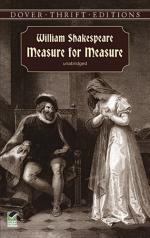|
This section contains 10,777 words (approx. 36 pages at 300 words per page) |

|
SOURCE: "'Infinite Space': Representation and Reformation in Measure for Measure" in Shakespeare Quarterly, Vol. 49, No. 4, Winter, 1998, pp. 393-410.
In the essay that follows, Diehl maintains that Shakespeare's use of "representational strategies, " such as substitutions, in Measure for Measure reflect his experimentation "with a Protestant aesthetic of the stage."
Measure For Measure is a deeply dissatisfying comedy, so problematic that, as Jean Howard argues, it "puts critics under stress."1 They typically respond by judging, finding fault with the play's structure, the Duke's elaborate manipulations, Isabella's ethical choices, Shakespeare's use of the bed-trick, and, especially, the final trial scene, with its exaggerated theatricality, its failure to effect any real reformation, and its unsettling subversion of the conventional comic ending.2 Identifying a pattern of failed, inadequate, and problematic substitutions in Measure for Measure, Alexander Leggatt, like many other critics, concludes that the play is flawed:
I am not saying that Shakespeare...
|
This section contains 10,777 words (approx. 36 pages at 300 words per page) |

|


